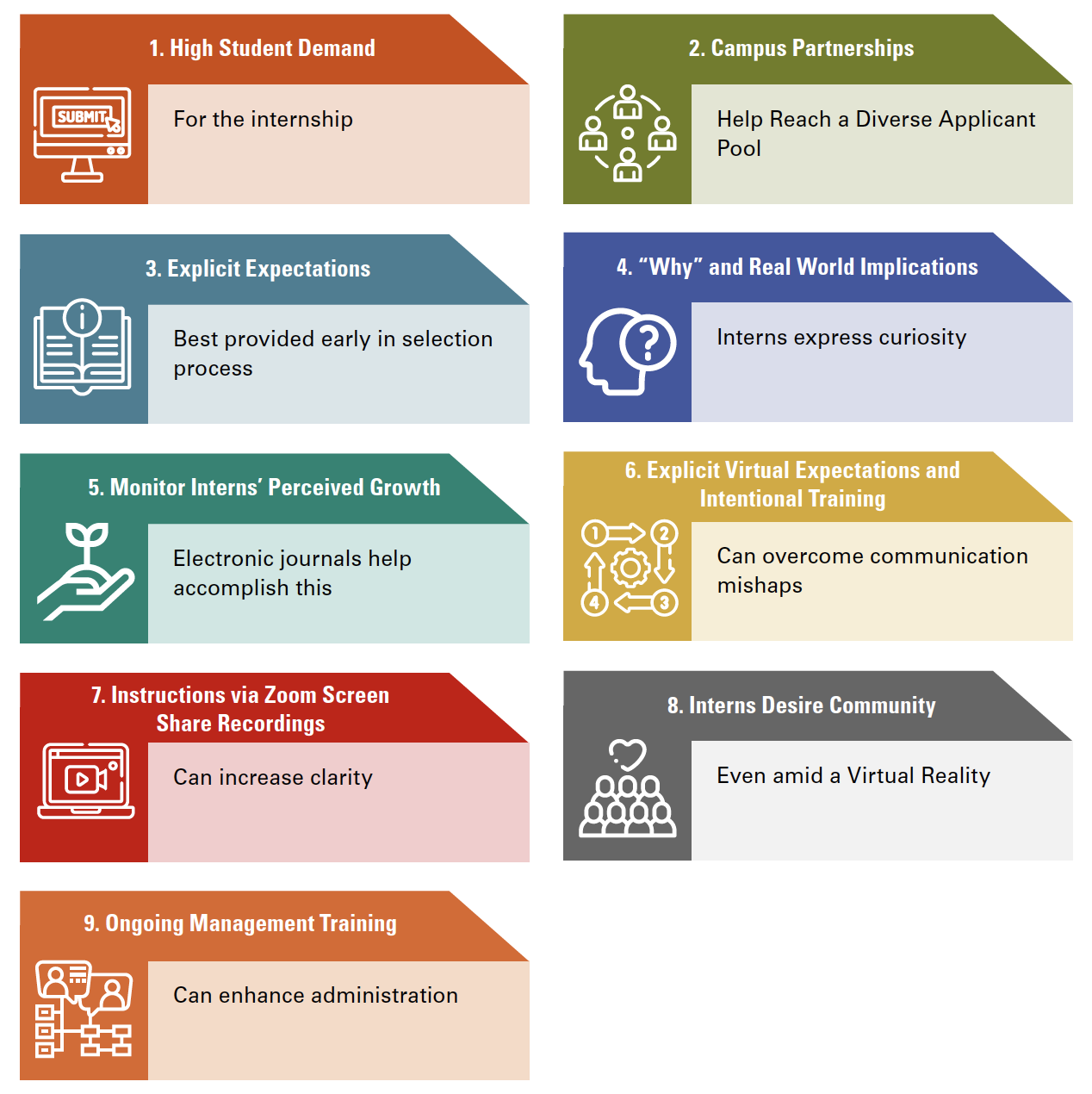The Program Evaluation and Education Research (PEER) Internship Program for Undergraduate Students: A Friday Institute Equity-Mindedness Initiative Pilot Year Evaluation Report
Abstract
During the 2020-2021 academic year, the Program Evaluation and Education Research (PEER) Group launched its first-ever undergraduate internship program. The program hosted five paid interns in partnership with the Federal Work-Study Program. Via the internship, undergraduate students received training in educational research and evaluation techniques while contributing to PEER Group projects. This program was strategically aligned with the Friday Institute’s impact area of “cultivating equity in education through equity-mindedness”, and students from historically marginalized communities were encouraged to apply. The program had three goals: (1) expose interns to the environment and expectations of educational research and evaluation, (2) develop interns’ transferable workforce skills, and (3) enhance PEER Group operations.
This evaluation report details the implementation and impact of this program during its pilot year. Data were collected via monthly memos, administrative documents and intern culminating assignments as well as surveys, interviews and focus groups with interns and full-time PEER Group staff members. Findings suggest that the program was successful in accomplishing its three goals. This report is organized into four sections. Section one provides an overview of the internship program. Section two chronicles how the internship program was implemented in its pilot year and illustrates a snapshot of the inaugural cohort. Section three recounts how qualitative and quantitative data was collected and analyzed and then draws on those data to measure the program’s impact on its three goals. Section four describes lessons learned from the pilot year as well as recommendations for the future.
Executive Summary
During the 2020-2021 academic year, the Program Evaluation and Education Research (PEER) Group launched its first undergraduate internship program, which included five interns. This program was strategically aligned with the Friday Institute’s impact area of “cultivating equity in education through equity-mindedness.” Eighty percent of the cohort identified as historically underrepresented racial and ethnic minorities, and 60% of the intern cohort identified as first-generation college students. The initial vision for this program was developed by Callie Womble Edwards, Ph.D., associate director of the PEER Group. Implementation began in summer 2020 when Edwards submitted a proposal to the PEER Group and Friday Institute Executive Director Hiller Spires, Ph.D., for review and approval. Once approved, Edwards led the planning, implementation and evaluation of the program and was the internship supervisor. The internship consisted of eight components:
Drawing on data collected from PEER Interns and the PEER Group, findings suggest that the program has achieved its goals of (1) exposing interns to the environment and expectations of educational research and evaluation, (2) developing interns’ transferable workforce skills, and (3) enhancing PEER Group operations. In particular, interns gained a real-world understanding of what it means to be an educational researcher or evaluator as well as experience performing the duties and responsibilities for educational research and evaluator roles. In addition, interns strengthened their technical and soft skill sets. Finally, PEER Group members found time and money savings by distributing tasks to interns throughout the year, and the model demonstrates several factors related to sustainability. This pilot year of the internship program illustrated nine important lessons for future iterations of the program related to intern selection, student development, remote programming and program management, which are as follows:
Given the findings and lessons learned, it is recommended that this program become a permanent part of PEER Group culture. To improve future cohorts, seven recommendations, also known as the 7 Is, are advised:
View Resource
Authors and Contributors
Related Resources
This report details the impact of the Program Evaluation and Education Research (PEER) Internship Program for Undergraduate Students during the 2021-22 academic year and provides recommendations for program improvement.
This brief summarizes the pilot year evaluation report that details the implementation and impact of the Program Evaluation and Education Research (PEER) internship program for undergraduate students. Findings suggest that the program was successful in accomplishing its three goals.
Teams
 Program Evaluation and Education Research (PEER) Group
Program Evaluation and Education Research (PEER) Group
Projects
The Program Evaluation and Education Research (PEER) Internship Program for Undergraduate Students
This internship is a paid work-study opportunity for undergraduate students to learn new research, evaluation and leadership skills. Interns will receive training in educational research and evaluation techniques while contributing to PEER Group projects.
Published
May 27, 2021
Resource Type
Report
Published By
Friday Institute for Educational Innovation
Suggested Citation
Edwards, C. W. (2021). The Program Evaluation and Education Research (PEER) Internship Program for Undergraduate Students: A Friday Institute Equity-Mindedness Initiative, Pilot Year Evaluation Report. Raleigh, NC. Friday Institute for Educational Innovation at the NC State University College of Education. [friday.institute/8985]




 PDF
PDF  Dr Callie Womble Edwards
Dr Callie Womble Edwards